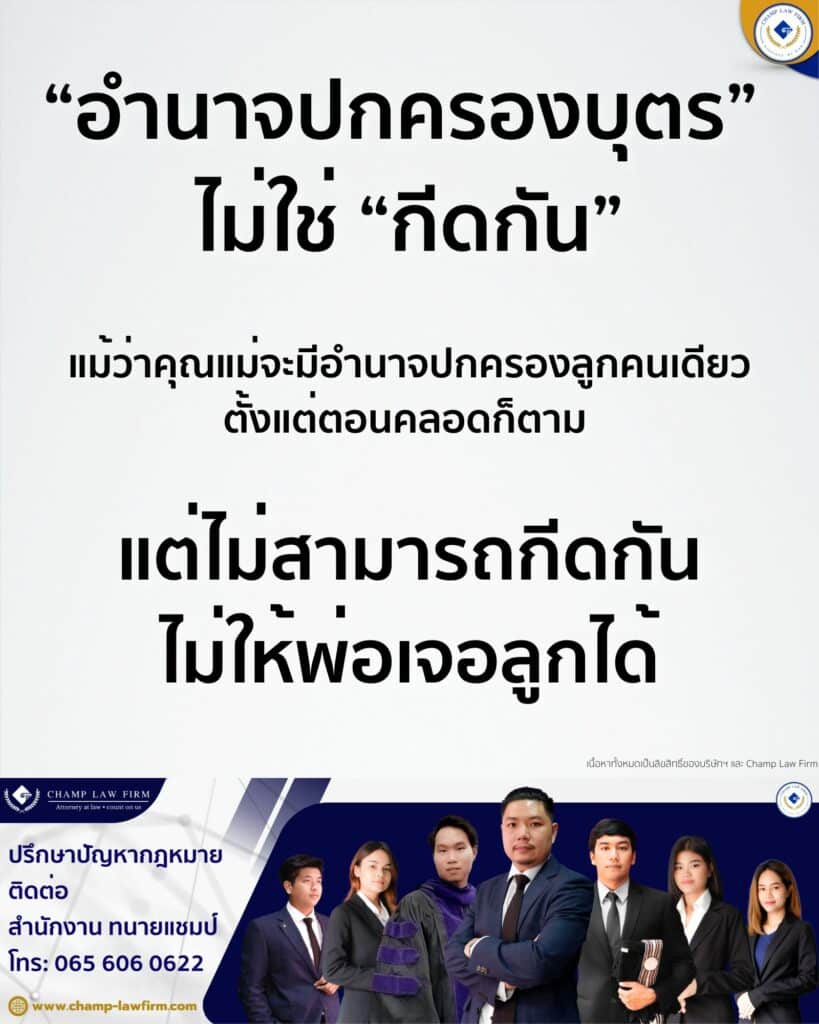สิทธิในตัวลูกของพ่อ
เรื่องพ่อกับลูกเป็นอีกหนึ่งเรื่องที่กฎหมายไม่ได้ให้ความคุ้มครองหรือรับรองแบบ 100% และมักจะเสียเปรียบฝ่ายแม่อยู่เสมอ เพราะความเป็นแม่ที่คลอดลูกออกมาชัดเจนมากพอที่กฎหมายจะรับรองสิทธิให้ก่อน
โดยเฉพาะพ่อที่มีลูกตอนไม่ได้จดทะเบียนสมรสกับแม่
ทำให้เกิดปัญหาที่แม่กีดกันไม่ให้ลูกเจอพ่อ หรือแม้กระทั่งแม่ดึงตัวลูกไว้เพื่อเรียกเงินจากฝ่ายพ่อ เป็นต้น บทความนี้จะกล่าวถึงความแตกต่างกันในสิทธิในตัวลูกของพ่อสถานะต่างๆ ไม่ว่าจะเป็น พ่อคนไทยจดทะเบียนสมรส, พ่อคนไทยไม่จดทะเบียนสมรส, พ่อต่างชาติจดทะเบียนสมรสหรือพ่อต่างชาติไม่จดทะเบียนสมรสและข้อแนะนำสำหรับคุณพ่อแบบต่างๆ
สารบัญเนื้อหา
-
พ่อไทย จดทะเบียนกับแม่
-
พ่อไทย ไม่จดทะเบียนกับแม่
-
พ่อต่างชาติ จดทะเบียนกับแม่
-
พ่อต่างชาติ ไม่จดทะเบียนกับแม่
-
ความเข้าใจผิดเรื่องการกีดกันลูก
-
การรับรองบุตร และ การร้องศาล คืออะไร
พ่อไทย จดทะเบียนกับแม่
ตามกฎหมายแล้วสิทธิในตัวลูกหรือที่เรียกว่า “อำนาจปกครองบุตร” จะเริ่มมีขึ้นตั้งแต่ลูกคลอดออกมาทันทีโดยกฎหมายได้กำหนดไว้ว่า ถ้าลูกคลอดออกมาแล้ว พ่อและแม่จดทะเบียนสมรสกันอยู่ทั้งคู่จะมีอำนาจปกครองบุตร “ร่วมกัน” หรือเรียกง่ายๆว่าคนละครึ่งนั่นเอง หมายความว่าในการดูแลลูกตัดสินใจเรื่องต่างๆ ต้องตัดสินใจด้วยกัน
กรณีนี้กฎหมายได้รับรองสิทธิให้พ่อเท่ากันกับแม่ทันทีตั้งแต่ลูกเกิดมาโดยไม่ต้องไปติดต่อที่อำเภอหรือไปศาลพิสูจน์ความเป็นพ่อก่อนเลย (อาจยกเว้นไว้ให้เรื่องหนึ่งคือไม่ใช่พ่อจริงๆแล้วพ่อที่แท้จริงไปร้องศาล)
เพราะฉะนั้นถ้าคุณพ่อคนไหนที่จดทะเบียนสมรสกับแม่แล้วลูกคลอดออกมา คุณได้สิทธิในตัวลูกเท่ากับแม่ทันทีครับ กฎหมายถือว่าการจดทะเบียนสมรสเป็นขั้นตอนที่ชัดเจนว่าทั้งสองคนอยากสร้างครอบครัวด้วยกันเลยได้กำหนดสิทธิและหน้าที่ไว้หลายอย่างความจริงไม่ใช่แค่เรื่องลูก แต่รวมไปถึงทรัพย์สินด้วย
พ่อไทย ไม่จดทะเบียนกับแม่
เคสส่วนใหญ่ที่มีปัญหากันคือเคสที่ “ไม่ได้จดทะเบียนสมรส” เพราะกฎหมายสันนิษฐานไม่ได้เลยว่าจะเป็นลูกจริงๆ ซึ่งกฎหมายไม่ได้ห้ามไว้นะว่าถ้าไม่จดทเบียนสมรสแล้วจะมีลูกไม่ได้ แต่พอไม่รู้ว่าจะเป็นพ่อลูกกันจริงไหมเลยไม่ได้ให้สิทธิพ่อในการดูแลลูก (ในตอนลูกเกิด) เท่ากับกรณีที่จดทะเบียนสมรส
เท่ากับว่ากรณีนี้พอลูกเกิดมา “อำนาจปกครองอยู่กับแม่คนเดียว” แม้ว่าจะใช้นามสกุลเดียวกับพ่อ หรือพ่อเลี้ยงดูไปรับส่งที่โรงเรียน แต่ในทางกฎหมายการตัดสินใจเรื่องต่างๆเกี่ยวกับลูกเป็นสิทธิของแม่เท่านั้น
วิธีที่จะทำให้พ่อมีอำนาจปกครองบุตรคือต้องไป “จดทะเบียนรับรองบุตร” หรือ “ไปขอศาล” นั่นเอง ซึ่งจะทำให้พ่อได้อำนาจปกครองบุตร “ร่วมกัน” กับแม่เหมือนกรณีที่จดทะเบียนสมรส
การรับรองบุตร เป็นการยืนยันความสัมพันธ์ระหว่าง พ่อ-ลูก โดยที่ไม่ต้องผูกพันกับผู้หญิงเเบบเป็นภริยาตามกฎหมาย
พ่อต่างชาติ จดทะเบียนกับแม่
กฎหมายไทยยอมรับการจดทะเบียนสมรสในต่างประเทศหรือจดทะเบียนสมรสที่สถานฑูตไทย ให้มีผลเป็นคู่สมรสกันได้ ดังนั้นจะเป็นคนไทยหรือต่างชาติในเรื่องนี้เราใช้กฎหมายเหมือนกัน
และคุณพ่อต่างชาติถ้าจดทะเบียนสมรสแล้วมีลูกก็มีอำนาจปกครองบุตรร่วมกันแม่ “เหมือนกับคนไทย”
พ่อต่างชาติ ไม่จดทะเบียนกับแม่
พ่อต่างชาติที่ไม่ได้จดทะเบียนกับแม่ ก็มีสิทธิขอรับรองบุตรต่อศาลเหมือนกับพ่อคนไทยเลยครับ
เพียงแต่กระบวนการและเอกสารจะยุ่งยากมากกว่าแค่นั้นเอง หลายครั้งที่ไปร้องต่อศาลแล้ว ศาลสั่งให้ตรวจ DNA เอกสารที่ใช้หรือพฤติการณ์การคบหากันที่อาจต้องอาศัยเพื่อนบ้านมาเป็นพยานให้สักหน่อย ทั้งนี้ศาลเราเองก็ต้องการป้องกันเรื่องการ “สวมรอย” ให้ลูกคนไทยไปรับมรดกของต่างชาติ
ดังนั้นพ่อต่างชาติยังไม่ต้องกังวลครับ มีหนทางให้คุณได้สิทธิในตัวลูกแน่นอน หรือถ้าสามารถคุยกันได้ก็จูงมือกันพ่อแม่ลูกไป “รับรองบุตร” ที่อำเภอได้เลย
ความเข้าใจผิดเรื่องการกีดกันลูก
“อำนาจปกครองบุตร” ไม่ใช่ “กีดกัน” แม้ว่าฝ่ายคุณแม่จะมีอำนาจปกครองลูกคนเดียวตั้งแต่ตอนลูกคลอดก็ตาม
แต่ไม่สามารถไปกีดกันไม่ให้พ่อไปเจอลูกได้นะครับ ถ้าเกิดว่ากีดกันเพื่อเรียกเงินเรียกทอง หรือไม่มีเหตุผลอะไรเลย ฝ่ายพ่อสามารถที่จะขอให้ศาลเพิกถอนอำนาจปกครองของคุณแม่ให้หมด และขอเอาลูกมาดูเเลเองคนเดียวได้
เพราะฉะนั้นฝ่ายหญิงเองที่ก็ต้องระวังการใช้อำนาจดูแลลูกด้วยถ้าไม่อยากถูกเพิกถอนแล้วให้พ่อเป็นคนดูแลลูกแทน

การรับรองบุตร คืออะไร
คือ การที่พ่อแม่และลูกเดินทางไปอำเภอแจ้งกับอำเภอว่าคนนี้เป็นลูกของพ่อจริงๆ และพ่อต้องการรับรองผลทางกฎหมายให้มีอำนาจปกครองบุตรร่วมกัน
การร้องศาล
คือการที่พ่อไปบอกศาลว่าเด็กคนนี้เป็นลูกและต้องการรับรองบุตร แต่ก่อนไปศาลต้องมีเหตุที่ไม่สามารถดำเนินการที่อำเภอได้ก่อนเท่านั้น เช่นอำเภอไม่ให้จดเพราะเด็กอายุน้อยเกินไปหรือไปอำเภอแล้วแต่แม่ไม่ยินยอม เป็นต้น
โดยเอาหลักฐานไปพิสูจน์ว่าเป็นพ่อลูกกันจริง ไม่ว่าจะตรวจ DNA หรือให้พยาน เพื่อนบ้านมาช่วยยืนยัน
จะเห็นได้ว่ากฎหมายให้ความสำคัญเรื่องความสัมพันธ์ พ่อ–ลูกในทุกๆมุม แต่ก็ไม่ได้รับรองตามความเป็นจริงตั้งแต่แรก ต่างกับฝ่ายแม่ที่มีความชัดเจนว่าลูกคลอดออกมาจากในท้องโดยตรง ซึ่งถ้าพ่อต้องการสิทธิในตัวลูกจริงๆก็สามารถใช้ขั้นตอนตามกฎหมายเรียกร้องได้เสมอไม่ว่าเวลาจะผ่านไปนานแค่ไหน เพราะเป็นสิ่งที่พิสูจน์ได้ตลอดในสายเลือด
เนื้อหาและเรียบเรียงโดย #ทนายแชมป์ #champlawyer


สอบถามเพิ่มเติม
ติดต่อทนาย
ส่งเมล์
info@champ-lawfirm.com
โทร
065 6060622
แชทไลน์
ID: @champlawfirm
สำนักงาน
47/86 Pattaya Klang Rd.